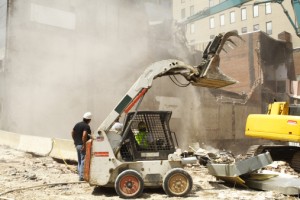 It’s been more than 12 years since our nation was forever changed by the attack on the World Trade Center. For many people, the memories of that day are still clear. For some, it’s because they lost a loved one. For others, it’s because they were on the ground in the hours, days, and weeks following. Some of these men and women are not only dealing with the mental effects of the rescue, recovery, and clean-up efforts, but they are dealing with physical illness and injury, too.
It’s been more than 12 years since our nation was forever changed by the attack on the World Trade Center. For many people, the memories of that day are still clear. For some, it’s because they lost a loved one. For others, it’s because they were on the ground in the hours, days, and weeks following. Some of these men and women are not only dealing with the mental effects of the rescue, recovery, and clean-up efforts, but they are dealing with physical illness and injury, too.
According to CNN.com, 1,140 people have been diagnosed with cancers resulting from the toxins in the air and on the ground after the collapse of the World Trade Center. Only recently were they told that they would be eligible for treatment funding under the World Trade Center Health Program, a fund set up to help treat the short- and long-term effects suffered by those involved in the September 11 recovery and cleanup.
Initially, those who were diagnosed with cancer were told no. Their expenses were denied when Dr. John Howard, administrator of the WTC Health Program said there wasn’t adequate evidence linking exposure at the 9-11 sites to cancer diagnoses. One year later, the program changed its tune.
In September 2012, the program added 58 types of cancer to the list of covered illnesses that would be eligible for treatment and funding. These cancers have been linked to the hundreds of chemical compounds in the air and on the ground at the sites. Benzene from jet fuel and asbestos from the buildings were just two of the culprits identified as cancer-causing agents.
Why the Hesitation?
Like employers confronted with an injury, the federal government was cautious about declaring a link between the contaminants at the WTC sites and cancer diagnoses among those who worked there. The concern, obviously, was partially financial. It was estimated that adding cancer coverage to the fund would cost from $14.5 million to $33 million. Program officials worried they would end up paying for cancer treatment that wasn’t caused by WTC exposure. After all, some cancer diagnoses that happened since the cleanup may have been coincidences.
The World Trade Center Health Program isn’t the same as workers’ compensation insurance. Still, it offers important lessons in accountability and how some people’s selfless work can end up costing them dearly.
Workplace Accidents and Illness
For people in the construction, manufacturing, and even public service industries, risks like this await them every day. Inhaling toxins like asbestos was commonplace a few decades ago, and although now we are wise to the dangers of it, demolition workers may still be exposed and at risk of cancer.
What many of us consider going the extra mile, other people do every day. To one extent or another, people in these fields put their lives on the line to provide for their families, exposing themselves to workplace hazards. In the case of public service employees, they often do it for your families, too.
Workers who suffer a work-related injury, illness or disease deserve justice and compensation for their conditions.
